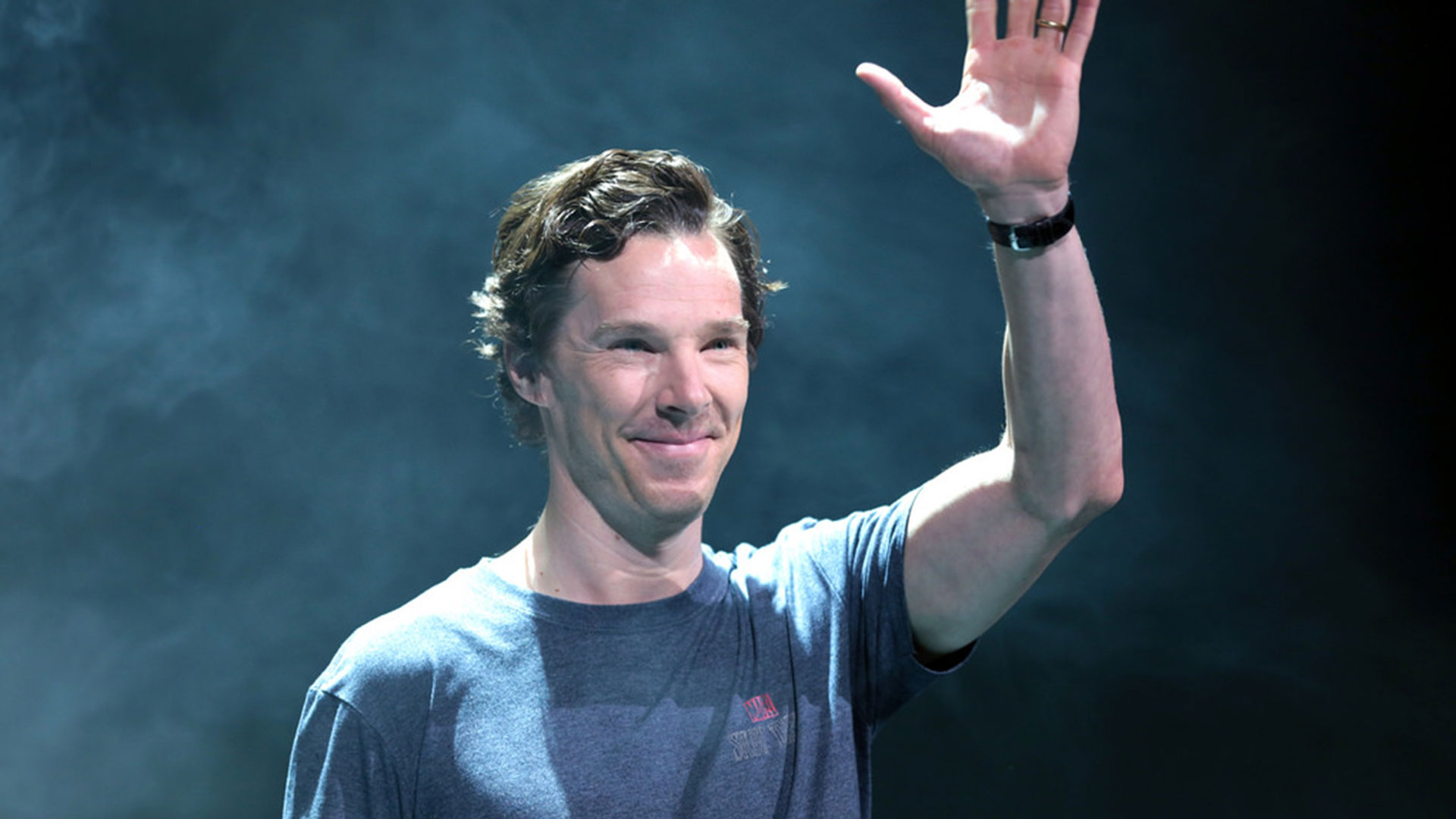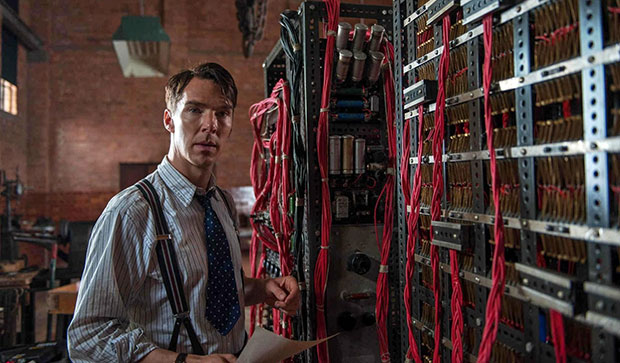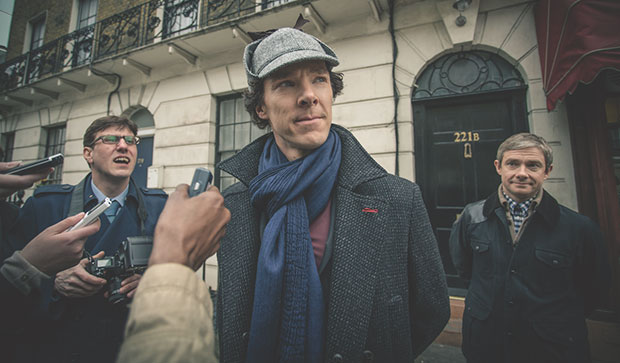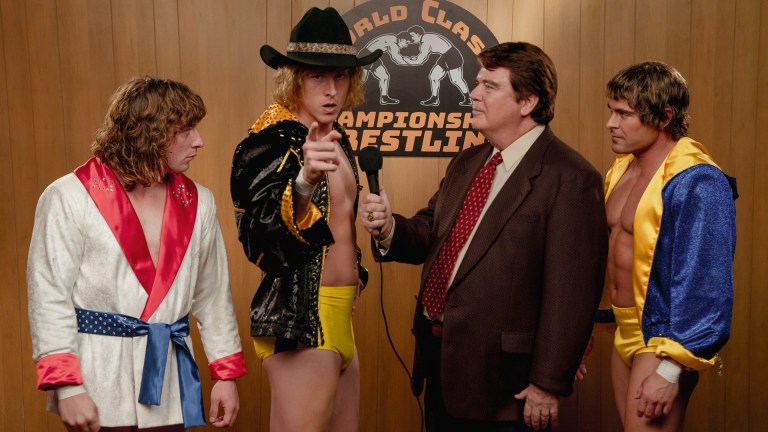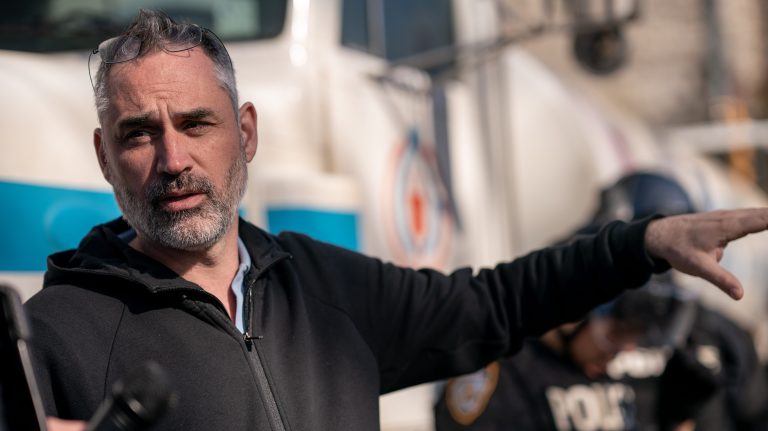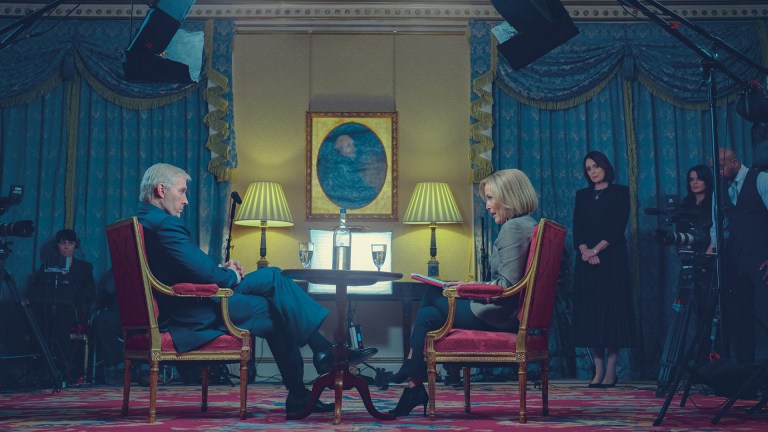The faint Trollopean air of strained courtesy is understandable; he’s been in this hotel suite playing host to a string of journalists for the best part of a day. Even a man of good breeding who likes to talk is likely to exude a touch of automaton fatigue after six hours of Q&A. It’s not disheartening. There’s definitely enough of a spark in his face – more traditionally handsome than it presents on-camera and, though arranged with a polite welcome to the fore, just a tiny bit minxy – to suggest the possibility of sudden energy.
It comes almost instantly, the moment I ask him if the story of Alan Turing, the wartime codebreaker and all-round maths/computing genius ‘exposed’ as a homosexual and chemically castrated in the early 1950s, made him angry.
“God, yes!” he flashes. “I wanted to tip tables over and shout from the rooftops – why the fuck did this happen? Who gives a fuck about government apologies or pardons now? It’s too late. The only person you can apologise to is him, and you can’t because you fucking killed him.”
The change in tone, from pleasantries to frenetics, as he steams up over the injustice which he is convinced led to Turing’s apparent suicide (he received a royal pardon last December, a mere 59 years after his death), is rather thrilling. Suddenly he’s chattering at breakneck speed, in harried half sentences, and with a turbulence akin (I have to say it) to a mind-racing Sherlock in the midst of a game-changing epiphany.
I tell him I’ve come straight from seeing the film – “Christ!” – and imagined we would thus have different perspectives, mine fresh and still emotional, his months old and perhaps somewhat over it. But it’s clear he still isn’t over it.
He assures me, “It’s not embarrassing at all” that I left the press screening with mascara tracks down my cheeks. “It’s more embarrassing when you’re actually in it and you have to pull back from being in floods of tears because it looks like you’re crying at your own performance and it’s not that at all. It happened when we were filming, shooting those closing scenes with Keira [Knightley], and I started breaking down.
I couldn’t stop crying, just thinking, my God, he went through this
“I couldn’t stop crying, just thinking, my God, he went through this. And to get near that understanding – because I’d played him for a while by then… God, it was just really upsetting. And I couldn’t quite get myself back, which isn’t good for acting.”
Maybe it is good for acting. It’s this intense empathy with his characters, which he seems at times incapable of controlling, that marks his best performances; Turing, Parade’s End’s Christopher Tietjens, Sherlock. A quick query about a detail of Turing’s work triggers in him a lengthy, raging, run-through of the cryptologist’s tragic life; the stammer he had developed by the age of four, having been separated from his parents since he was a baby, “completely borne out of not having immediate paternal love, the maternal nurturing and breast-feeding and things you need”; the “ridiculous lives of secrecy and suppression” he and other gay men were forced into; his failure to develop a meaningful sexual relationship, and tendency to appear “short-tempered or removed from other people’s concerns”, but at the same time, “deeply sensitive, incredibly grateful to the people he worked with, very alive to the world and capable of huge, huge love”.
He possessively refers to Turing as ‘Alan’ and has many personal, almost defensive theories about the scientist’s eccentricities (he rails at suggestions Turing was autistic). Evidently identifying with and caring about his character in this film was not a struggle.
And yet the two men couldn’t have had more different experiences. While Turing lived a life of isolation and suffered persecution, 38-year-old heartthrob Benedict Timothy Cumberbatch says the headline of his life is: “I’ve been very, very lucky. I’ve been surrounded by love from a very early age and it’s easier to place value on your own existence if you get love first-off as a child.”
Our 2020 Impact Report
The Big Issue has given more than £1 million support to Big Issue vendors struggling due to the lockdown restrictions. To mark the significant milestone, we have published an impact report, documenting the seismic shift the organisation has undergone in the past 12 months.
View ReportThe son of esteemed actors Timothy Carlton and (the distinctly glamorous) Wanda Ventham – they played his parents in recent episodes of Sherlock – Cumberbatch grew up in Kensington, and at age eight went to boarding school in Sussex where he says he developed a love of the countryside. He went on to study arts at Harrow. So far, so rarified, though don’t make the observation to his face – he can be a bit tetchy about being labelled a posh boy.
Actually, he’s right to get irritated by the lazy prejudice that has seen his acting derided on account of his background. So what if he’s posh? His allure has more to do with his boyish energy and the depth of feeling he brings to his work, so that even the most sociopathic and closed-down of his characters arouses compassion. He has a command absent in many of his peers, which is why he inspires an army of followers, growing since he impressed in a 2005 Olivier-nominated performance in the Almeida’s Hedda Gabler, and of course rocketing when he nailed Sherlock Holmes.
“I’ve played straight-up heroes and comic fools and kids next door,” he says. “But the oddballs, the outsiders – Sherlock, Assange, Turing – they spike. And there’s a reason for that. Because they make us lean in. And that’s what makes them attractive.”
Cumberbatch himself is a beguiling mixture of emotional extremes. He might be tired today but his shoulders never slump as he swings from political passion (he works extensively with various charities and pressure groups: Stonewall, Liberty, The Prince’s Trust and Stop the War have all benefitted from his zeal) to dreamy romance, and from vaulting ambition to meditation-aided mindfulness.
“I get worried about the state of the world and upset about what people deem important,” he says. But despite what he calls “some near misses”, including being abducted and held at gunpoint in South Africa in 2005: “I try to be optimistic. I love losing myself in nature, I’m never happier than when I’m staring at the sea. The absorption into a moment, lost in meditative focus looking at that point where the horizon meets the sea.
“I love being off the grid and just having the primal experiences that we’re all entitled to as humans on this Earth – whether it’s love of someone dear to us, children, nature… I know it sounds very soppy but it’s hugely important to nourish what it is in us that’s human.”
For a man whose casual admission that he’d really like to have a family led to an online meltdown, years of journalistic hounding and an explosion of oestrogen detectable from outer space, Cumberbatch still talks a lot about children, repeatedly using them as examples of things that inspire tectonic yearning and love. One of his theories about Turing is that he was desperate to have children and that it might have been the thwarting of this hope when he was chemically castrated that caused his suicide.
He admits that when he was younger he was quite confident that by the age of 32 the “more seismic things of adulthood would have come, including being a father”. But he’s more wary now when it comes to talking about his private life because “it always comes back to haunt me in strange ways. I’ve been judged for my relationships or not being a father in the weirdest ways. All I’ll say is, when it’s right, it’s right”.
As it happens, a couple of weeks after this coy little shrug, the engagement of ‘Mr BT Cumberbatch and Miss SI Hunter’ is announced discreetly on page 57 of The Times. The shirky scoundrel! And perhaps I’m reading too much into it but I can’t help wondering if his impending joyous nuptials and changing considerations regarding the new arc in his life inspired this particular train of thought…
As I get older I increasingly feel the need to step back, ask what I’m neglecting, what do other people need of me
“I’m starting to realise you can say no to things and it won’t all fall to pieces. I really want to do more, by which I mean less work and more of other things. I want to be more present for other people. As I get older I increasingly feel the need to step back, ask what I’m neglecting, what do other people need of me. I want to be more impulsive, to be able to suddenly go away for the weekend. Whenever I get the rare chance to be impulsive I grab it with both hands, which is why I do stupid things sometimes. Having said that, I don’t know how long I’ll ride a motorbike for. I’m sure if and when I become a dad I won’t want to do that any more.”
If there’s a whiff of ‘I promise, darling’ about that last remark, all to the good. If any man can get excited about giving things up for the benefit of his imaginary future family, it’s probably Benedict Cumberbatch. But still, his dreaminess isn’t reserved entirely for marriage and babies.
“I remember, when I was about 16, coming back from seeing The Madness of George III with the brilliant Nigel Hawthorne. It was a theatre trip with the school, which was always a burst of what life might be, the world outside the weird privileged confines of a boarding school.
“I was just having a cigarette, leaning out of my bedroom window, watching the clouds scuttle across the sky and the moon breaking through every now and then, and thinking about what the actual life of King George was like, that madness which turned out to be a misdiagnosed illness. And I was thinking about Nigel Hawthorne and the experience I’d just had, sucking my cigarette, getting a little nicotine high, and suddenly I felt this air blowing through me going, I think I’m on my way. I think this is what it is, I think this is what I want to do.
“Then I thought, what is it about this moment, why do I want to bottle this now? What do I do about it? Do I write a poem? Should I listen to music, tell someone? And I thought no, I’ll just sit in it for a moment.
“Imagine telling that boy about the life he was going to lead. Imagine!”
